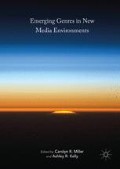Abstract
The author employs both rhetorical move analysis and corpus-assisted discourse analysis to examine online “patient narratives” collected from one of the largest AIDS discussion forums in the USA. Focusing on possible contraction of HIV/AIDS after perceived high-risk behaviors, this genre differs from traditional patient narratives because of its preoccupation with risk assessment and testing. Three types of rhetorical moves were identified, namely, informative, interactive, and emotional, which suggests posters’ need for accurate information, empathy, and communal support. Serving as an intermediary genre, the online risky AIDS narratives could help bridge the gap between at-risk populations and health communicators and public health educators to enhance the existing understanding of possible health, emotional, social, and psychological concerns that such individuals may have when seeking medical help.
Access this chapter
Tax calculation will be finalised at checkout
Purchases are for personal use only
References
Aston, Guy. 1997. Small and large corpora in language learning. In Practical applications in language corpora, eds. B. Lewandowska-Tomaszczyk and J. Melia, 51–62. Lodz: Lodz University Press.
Atkinson, Paul. 1997. Narrative turn or blind alley? Qualitative Health Research 7: 325–344.
Berkenkotter, Carol, and Thomas Huckin. 1993. Rethinking genre from a sociocognitive perspective. Written Communication 10: 475–509.
Bhatia, Vijay. 1993. Analyzing genre: Language use in professional settings. London: Longman.
Blood, Rebecca. 2000. Weblogs: A history and perspective. www.rebeccablood.net/essays/weblog_history.html. Accessed 31 Dec 2003.
Centers for Disease Control and Prevention. 2009. Oral sex and HIV risk. www.cdc.gov/hiv/resources/factsheets/oralsex.htm. Accessed 18 Oct 2013.
Chou, Wen-Ying Sylvia, Yvonne Hunt, Anna Folkers, and Erik Augustson. 2011. Cancer survivorship in the age of YouTube and social media: A narrative analysis. Journal of Medical Internet Research 13. www.ncbi.nlm.nih.gov/pmc/articles/PMC3221357/
Connor, Ulla, and Anna Mauranen. 1999. Linguistic analysis of grant proposals: European Union Research Grants. English for Specific Purposes 18: 47–62.
Connor, Ulla, Kenneth Davis, and Teun De Rycker. 1995. Correctness and clarity in applying for overseas jobs: A cross-cultural analysis of U.S. and flemish applications. Text 15(4): 457–476.
Ding, Huiling. 2007. Genre analysis of personal statements: Analysis of moves in application letters to medical schools. English for Specific Purposes 26: 368–392.
Eisenberg, Eric M., Alexandra G. Murphy, Kathleen Sutcliffe, Robert Wears, Stephen Schenkel, Shawna Perry, and Mary Vanderhoef. 2007. Communication in emergency medicine: Implications for patient safety. Communication Monographs 72 : 390–413.
Emmons, Kimberly K. 2009. Uptake and the biomedical subject. In Genre in a changing world, eds. Charles Bazerman, Adair Bonini, and Débora Figueiredo, 134–157. Fort Collins: The WAC Clearinghouse and Parlor Press.
Flowerdew, Lynne. 2004. The argument for using English specialized corpora to understand academic and professional language. In Discourse in the professions: Perspectives from corpus linguistics, eds. Ulla Connor and Thomas Upton, 11–36. Amsterdam: John Benjamins.
Frank, Arthur W. 1994. Reclaiming an orphan genre: The first-person narrative of illness. Literature and Medicine 13: 1–21.
Freadman, Anne. 2002. Uptake. In The rhetoric and ideology of genre: Strategies for stability and change, eds. Richard Coe, Lorelei Lingard, and Tatiana Teslenko, 39–53. Cresskill: Hampton Press.
Freedman, Aviva, and Peter Medway. 1994. Locating genre studies: Antecedents and prospects. In Genre and the new rhetoric, 1–20. London: Taylor & Francis.
Hyden, Lars-Christer. 1997. Illness and narrative. Sociology of Health and Illness 19: 48–69.
Kleinman, Arthur. 1988. The illness narratives: Suffering, healing, and the human condition. New York: Basic Books.
Meier, Andrea, Elizabeth Lyons, Gilles Frydman, Michael Forlenza, Barbara Rimer. 2007. How cancer survivors provide support on cancer-related internet mailing lists. Journal of Medical Internet Research 9 (2). https://www.jmir.org/article/citations/591. PMC1874721
Miller, Carolyn R. 1984. Genre as social action. Quarterly Journal of Speech 70: 151–167.
———. 1994. Rhetorical community: The cultural basis of genre. In Genre and the new rhetoric, eds. Aviva Freedman and Peter Medway, 67–77. London: Taylor & Francis.
———. 2004. Blogging as social action: A genre analysis of the weblog. In Into the blogosphere: Rhetoric, community, and culture of weblogs, eds. Laura J. Gurak, Smiljana Antonijevic, Laurie Johnson, Clancy Ratliff, and Jessica Reyman. http://blog.lib.umn.edu/blogosphere/visual_blogs.html. Accessed 10 Oct 2013.
Mortensen, Torill, and Jill Walker. 2002. Blogging thoughts: Personal publication as an online research tool. In Researching ICTs in context, ed. Andrew Morrison, 249–279. Oslo: InterMedia, University of Oslo.
Swales, John. 1990. Genre analysis: English in academic and research settings. Cambridge, UK: Cambridge University Press.
———. 1996. Occluded genres in the academy: The case of the submission letter. In Academic writing: Intercultural and textual issues, eds. Eija Ventola and Anna Mauranen, 45–58. Amsterdam: John Benjamins.
Tachino, Tosh. 2012. Theorizing uptake and knowledge mobilization: A case for intermediary genre. Written Communication 29: 455–476.
Author information
Authors and Affiliations
Editor information
Editors and Affiliations
Rights and permissions
Copyright information
© 2017 The Author(s)
About this chapter
Cite this chapter
Ding, H. (2017). Cross-Culturally Narrating Risks, Imagination, and Realities of HIV/AIDS. In: Miller, C., Kelly, A. (eds) Emerging Genres in New Media Environments. Palgrave Macmillan, Cham. https://doi.org/10.1007/978-3-319-40295-6_8
Download citation
DOI: https://doi.org/10.1007/978-3-319-40295-6_8
Published:
Publisher Name: Palgrave Macmillan, Cham
Print ISBN: 978-3-319-40294-9
Online ISBN: 978-3-319-40295-6
eBook Packages: Literature, Cultural and Media StudiesLiterature, Cultural and Media Studies (R0)

